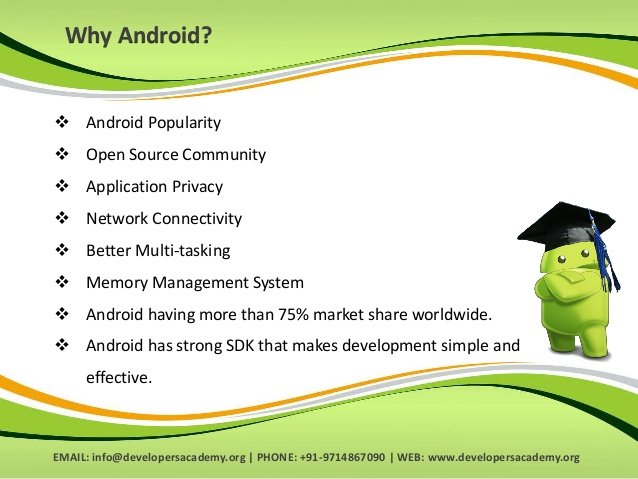**Requirements******
**Windows OS******
Microsoft Windows 7/8/10 (32-bit or 64-bit)
2 GB RAM minimum, 8 GB RAM recommended
2 GB of available disk space minimum,
4 GB Recommended (500 MB for IDE + 1.5 GB for Android SDK and emulator system image)
1280 x 800 minimum screen resolution
JDK 8
For accelerated emulator: 64-bit operating system and Intel processor with support for Intel VT-x, Intel EM64T (Intel 64), and Execute Disable (XD) Bit functionality
**
Mac OS******
Mac OS X 10.8.5 or higher, up to 10.11.4 (El Capitan)
2 GB RAM minimum, 8 GB RAM recommended
2 GB of available disk space minimum, 4 GB Recommended (500 MB for IDE + 1.5 GB for Android SDK and emulator system image)
1280 x 800 minimum screen resolution
JDK 6
Difficulty
Intermediate
Tutorial Contents
## Curriculum (of the Learn Andriod Series):
Learn Andriod Series (#1)What is Android
Learn Andriod Series (#2)History and Version
Learn Andriod Series (#3)Software Stack
Learn Andriod Series (#4)Core Building Blocks
Learn Andriod Series (#5)Android Emulator
Learn Andriod Series (#6)Installing softwares
Learn Andriod Series (#7)Hello Android example
Learn Andriod Series (#8)Internal Details
Learn Andriod Series (#9)Dalvik VM
Learn Andriod Series (#10)AndroidManifest.xml
Learn Andriod Series (#11)R.java
Learn Andriod Series (#12)Hide Title Bar
Learn Andriod Series (#13)UI Widgets
Learn Andriod Series (#14)Working with Button
Learn Andriod Series (#15)ToastCustom
Learn Andriod Series (#16)ToastToggleButton
Learn Andriod Series (#17)CheckBoxCustom
Learn Andriod Series (#18)CheckBox
Learn Andriod Series (#19)RadioButton
Learn Andriod Series (#20)Dynamic RadioButton
Learn Andriod Series (#21)Custom RadioButton
Learn Andriod Series (#22)AlertDialog
Learn Andriod Series (#23)Spinner
Learn Andriod Series (#24)AutoCompleteTextView
Learn Andriod Series (#25)ListView
Learn Andriod Series (#26)Custom ListView
Learn Andriod Series (#27)RatingBar
Learn Andriod Series (#28)WebViewSeek
Learn Andriod Series (#29)BarDatePicker
Learn Andriod Series (#30)TimePicker
Learn Andriod Series (#31)Analog and Digital
Learn Andriod Series (#32)ProgressBar
Learn Andriod Series (#33)Vertical ScrollView
Learn Andriod Series (#34)Horizontal ScrollView
Learn Andriod Series (#35)ImageSwitcher
Learn Andriod Series (#36)ImageSlider
Learn Andriod Series (#37)ViewStub
Learn Andriod Series (#38)TabLayout
Learn Andriod Series (#39)TabLayout with FrameLayout
Learn Andriod Series (#40)SearchView
Learn Andriod Series (#41)SearchView on Toolbar
Learn Andriod Series (#42)EditText with TextWatcher
Learn Andriod Series (#1)What is Andriod ?
A brief Andriod introduction
Android is a complete set of software for mobile devices such as tablet computers, notebooks, smartphones, electronic book readers, set-top boxes etc.
It contains a linux-based Operating System, middleware and key mobile applications.
It can be thought of as a mobile operating system. But it is not limited to mobile only. It is currently used in various devices such as mobiles, tablets, televisions etc.
Android offers a unified approach to application development for mobile devices which means developers need only develop for Android, and their applications should be able to run on different devices powered by Android.
Why Android ?

Features of Android

Posted on Utopian.io - Rewarding Open Source Contributors
Thank you for your contribution, yet it cannot be accepted.
This is not a valid tutorial contribution. The content needs to be original, targeted, and well explained.
Copying content from elsewhere is frowned upon, and could lead to your account being banned.
To learn more about the rules for tutorial submissions, check out Utopian Rules
Need help? Write a ticket on https://support.utopian.io.
Chat with us on Discord.
[utopian-moderator]